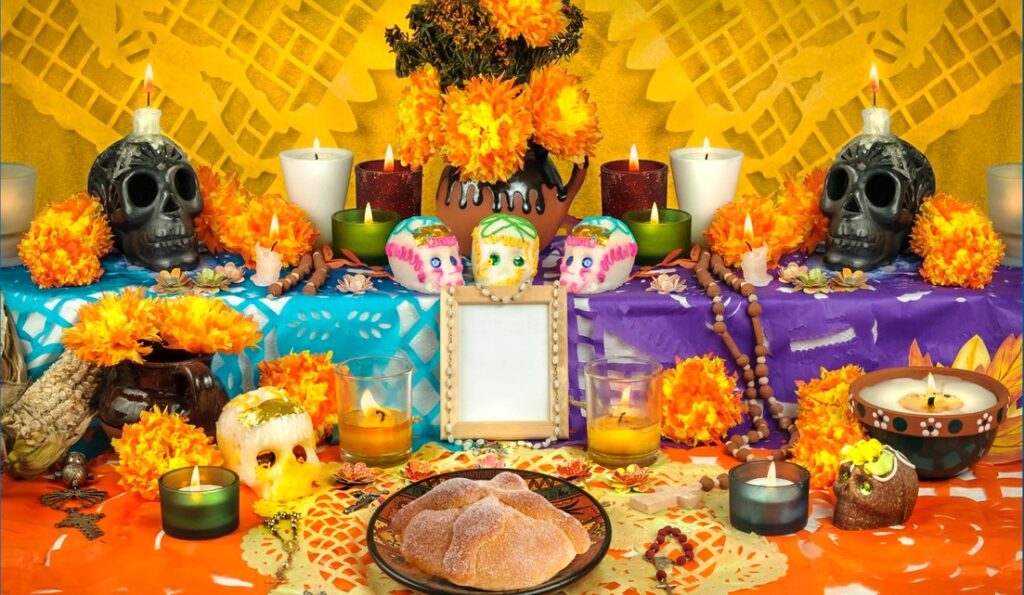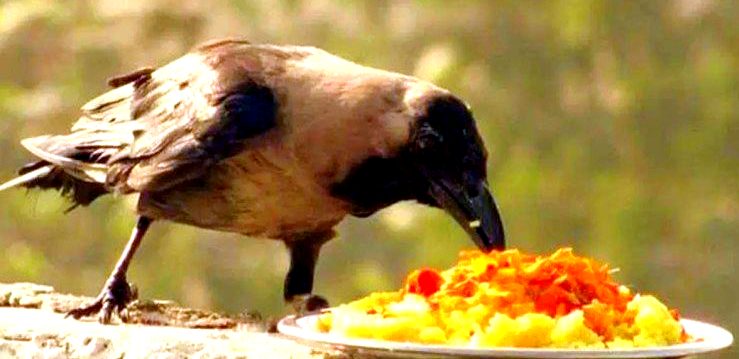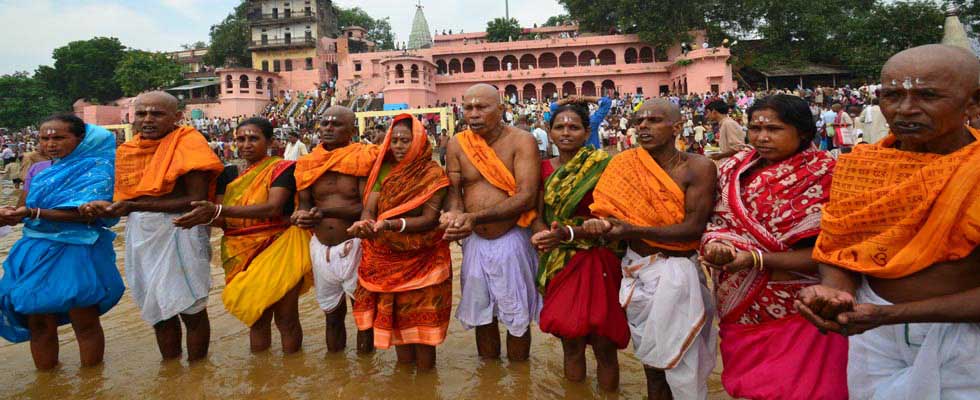
Pitru Paksha literally the ‘fortnight for the Ancestors‘. Pitru Paksha, also known as Mahalaya Paksha, is a 16-day period in the Hindu lunar calendar dedicated to paying homage to one’s ancestors or pitrs.
Almost every culture in the world honours its dead ancestors. For instance, the Japanese Buddhists observe Bon-Odori where families come together to welcome their ancestral spirits. Mexicans observe Dia de los Muertos or the Day of the Dead. Furthermore, Halloween, or All Hallow’s Eve, is a celebration specifically for remembering the dead, the saints, martyrs, and all other faithfully departed. In fact, in Chinese culture, there is an entire month called ‘ghost month’ which is dedicated specifically to honouring their ancestors.

Likewise, in India, too, Hindus have a period of paying homage to their departed ancestors. This period of 16 days is called Pitru Paksha – ‘Pitru’ means Ancestors and ‘Paksha’ means a fortnight. Thus, the sixteen days of the Hindu month of Bhadrapada is Pitru Paksha. This Paksha begins on Purnima – Full Moon Day and ends on Amavasya – No Moon Day. The last day – ‘Sarva Pitri Amavasya‘ or the ‘Mahalaya Amavasya’ – is a day for honouring all the ancestors.
This year, Pitru Paksha starts on 07 September 2025 and ends on 21 September 2025.
Pitru Paksha is not a time for celebrations. It is, in fact, a fervent period earmarked for remembering the departed ancestors and performing special rites for the salvation of their souls. Hindus believe that during the Pitru Paksha, their deceased ancestors leave their abode, Pitru Lok (Land of the Dead) and descend on Prithvi Lok viz the Earth.
STORY BEHIND OBSERVANCE OF PITRU PAKSHA

In Mahabharata, when the legendary Karna reached heaven after death, he was offered food made of solid gold. In his lifetime, he was famous as ‘Daanveer’ due to his bigheartedness and generous nature. He complained to Lord Indra that he was very hungry and obviously, could not eat gold. Indra smiled and reminded him that though he offered a lot of gold in charity when alive, he never provided any food to his ancestors or performed the Shraddha ceremony. Karna realized his mistake. He requested that Lord Indra give him one chance to return to Earth and correct his mistake. Thereby, Lord Indra granted him his wish. Karna returned to Earth and fed the poor for 16 days. This was the period of Pitru Paksha.
MAIN RITUALS OF PITRU PAKSHA
There are three main rituals of Pitru Paksha – Tarpan, Shraadh and Pind Daan.

- ‘Trup’ which means satisfaction is the root word of the word ‘Tarpan’. Thus, Tarpan means paying oblations to Gods, Sages and ancestors by offering water to satisfy them with Black sesame (til) seeds mixed in it. One should perform this ritual while standing in a river or a water body. Tarpan for the deceased ancestors is performed facing south. A ring made of dried Kusha or Durva grass is worn on the finger while performing the ritual.

- ‘Pind Daan’ is another ritual performed along with Shraddha. This involves making an offering of ‘Pindis’. Pindis are balls of cooked rice and barley with black sesame seeds, cow’s milk, honey, sugar and ghee. Pind Daan is usually done either on a silver plate or a leaf.

- The word ‘Shraddha’ has originated from ‘Shraddha’ (faith). Shraddha is the ritual of offering food to the priests (Brahmins). While feeding the priests one expresses his gratefulness to his ancestors through them. Besides food, one can also distribute clothes and money to the Brahmins and the poor.
IMPORTANCE OF CROWS IN PITRU PAKSHA
 Hindus believe that crows are messengers of Yama, the God of Death. Any food fed to the crows directly satiates the ancestors’ spirit. According to the Puranas, the crows had tasted the nectar, Amrit – which made them immortal. Even today, it is widely believed that no crow dies its natural death. It dies only sudden death due to an attack or accident. Incidentally, both crows and the Peepal (Sacred Fig) tree represent the Pitrus – the dead ancestors. Hence, feeding crows and watering the Peepal tree are important rituals of Pitru Paksha. Besides the crows, there is also a custom of feeding cows, dogs, ants and beggars during Pitru Paksha.
Hindus believe that crows are messengers of Yama, the God of Death. Any food fed to the crows directly satiates the ancestors’ spirit. According to the Puranas, the crows had tasted the nectar, Amrit – which made them immortal. Even today, it is widely believed that no crow dies its natural death. It dies only sudden death due to an attack or accident. Incidentally, both crows and the Peepal (Sacred Fig) tree represent the Pitrus – the dead ancestors. Hence, feeding crows and watering the Peepal tree are important rituals of Pitru Paksha. Besides the crows, there is also a custom of feeding cows, dogs, ants and beggars during Pitru Paksha.
POPULAR PLACES OF CONDUCTING PITRU PAKSHA RITUALS

- Brahma Kapal Ghat, Badrinath
- Haridwar in Uttarakhand
- Dev Prayag in Uttarakhand
- Trimbakeshwar in Nashik, Maharashtra
- Bharat Kund in Ayodhya, Uttar Pradesh
- Vishranti Tirth in Mathura, Uttar Pradesh
- Assi Ghat and Manikarnika Ghat in Varanasi, Uttar Pradesh
- Triveni Samgam in Allahabad, Uttar Pradesh
- Naimishaaranya in Uttar Pradesh
- Narmada Ghat in Jabalpur, Madhya Pradesh
- Avantika, Kshipra Ghat in Madhya Pradesh
- Pehova in Kurukshetra, Haryana
- Pushkar in Ajmer, Rajasthan
- Matrugaya Kshetra, Siddhpur in Patan, Gujarat
- Dwarka in Jamnagar, Gujarat
- Gaya Ghat in Bihar
- Jagannath Puri in Orissa
- Tirupati in Tamil Nadu
RULES REGARDING FOOD PREPARED FOR OFFERINGS
- Firstly, the food prepared is Sattvic – ie without onion and garlic. Non-vegetarian food is strictly prohibited.
- Furthermore, one should avoid root vegetables like potatoes, sweet potatoes, colocasia, radish, carrots, etc, and vegetables like eggplants, tomatoes, cabbage, and drumsticks. Even strong spices should be avoided.
- Usually, the preferred sattvic dishes include Urad dal vadas, rice kheer or payasam, seasonal vegetables like all types of gourd, raw plantains, ladyfinger, green beans, dals, leafy vegetables, seasonal fruits, etc.
- Also, it is best to serve food is on banana leaves.
- After preparing the food, keep aside food for cow, dog and crow. Thereafter, offer food to Brahmins (priests) and needy people. Only after they have been satisfactorily fed, can the family members consume the food.
To read about REMEDIES FOR PITRA DOSHA IN A HOROSCOPE, click HERE
What should you do during Pitra Paksha?
What should you NOT do during Pitra Paksha?
- Make donations and offer food and clothes to the needy in the name of your ancestors.
- Donation of black sesame seeds is auspicious.
- Regularly chant Mantras like the Maha Mrityunjaya Mantra and Gayatri Mantra.
- Show respect and humility towards elders and ancestors.
- Feed animals like dogs, cows and crows.
- If possible, visit pilgrimage sites or temples and offer prayers for your ancestors’ well-being.
- Avoid doing auspicious work or starting any new ventures such as buying a new house or beginning a new business.
- Avoid buying new items or vehicles.
- Avoid wearing or buying new clothes.
- Avoid lying, using harsh words, or cursing others.
- Avoid wearing sandals at home.
- Refrain from cutting hair and nails.
- Avoid arguments or conflicts during this period.
- Do not waste food or resources.

